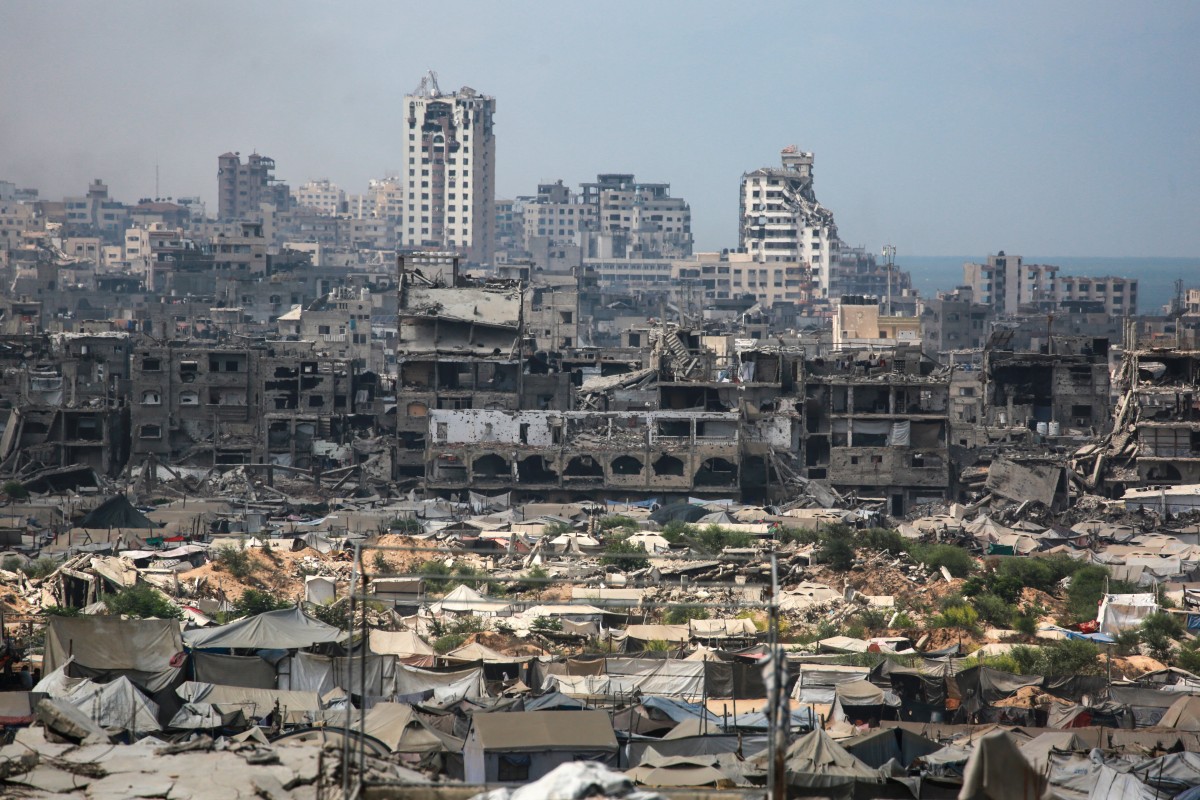Jerusalem, Undefined — Israel’s military will “take control” of Gaza City under a new plan approved by Prime Minister Benjamin Netanyahu’s security cabinet, touching off a wave of criticism Friday from both inside and outside the country.
Nearly two years into the war in Gaza, Netanyahu faces mounting pressure to secure a truce to pull the territory’s more than two million people back from the brink of famine and free the hostages held by Palestinian militants.
Hamas has denounced the plan to expand the fighting as a “new war crime”.
Staunch Israeli ally Germany meanwhile took the extraordinary step of halting military exports out of concern they could be used in Gaza.
Under the newly approved plan to “defeat” Hamas, the Israeli army “will prepare to take control of Gaza City while distributing humanitarian assistance to the civilian population outside combat zones”, the premier’s office said Friday.
Before the decision, Netanyahu had said Israel planned to seize complete control of the Gaza Strip, but did not intend to govern it.
The premier told US network Fox News on Thursday that Israel wanted to maintain a “security perimeter” and to hand the Palestinian territory to “Arab forces that will govern it properly without threatening us”.
Israel occupied Gaza from 1967, but withdrew its troops and settlers in 2005.
Netanyahu’s office said the cabinet had adopted “five principles”, including Gaza’s demilitarization and “the establishment of an alternative civil administration that is neither Hamas nor the Palestinian Authority”.
The plan triggered swift criticism from across the globe, with China, Turkey, Britain and the UN’s rights chief as well as numerous Arab governments issuing statements of concern.
‘March of recklessness’
In a major shift, German Chancellor Friedrich Merz announced his country was halting military shipments to Israel, saying it was “increasingly difficult to understand” how the new plan would help achieve legitimate aims.
“The German government will not authorize any exports of military equipment that could be used in the Gaza Strip until further notice,” he said.
Israeli opposition leader Yair Lapid denounced the cabinet’s move as “a disaster” that could result in “the death of the hostages, the killing of many soldiers… and lead to diplomatic bankruptcy”.
European Council chief Antonio Costa warned “such a decision must have consequences” for EU-Israel ties.
“I strongly urge the Israeli government to reconsider its decision,” Costa, who heads the body representing the bloc’s 27 states, wrote on X. “The situation in Gaza remains dramatic, and the decision by the Israeli government will only further worsen it.”
The main campaign group for hostages’ families also slammed the plan, saying it amounted to “abandoning” the captives.
“The cabinet chose last night to embark on another march of recklessness, on the backs of the hostages, the soldiers, and Israeli society as a whole,” the Hostage and Missing Families Forum said.
An expanded Israeli offensive could see ground troops operate in densely populated areas where hostages are believed to be held, local media have reported.
Some Israelis, meanwhile, offered their support.
“As they take control of Gaza, they will eliminate Hamas completely — maybe not completely, but at least a good percentage of them,” said Chaim Klein, a 26-year-old yeshiva student.
The Israeli army said last month that it controlled 75 percent of the Gaza Strip.
Out of 251 hostages captured during Hamas’s 2023 attack, 49 are still being held in Gaza, including 27 the military says are dead.
‘We are human beings’
Gaza residents said they feared further displacement and attacks as they braced for the next onslaught.
“They tell us to go south, then back north, and now they want to send us south again. We are human beings, but no one hears us or sees us,” Maysa al-Shanti, a 52-year-old mother of six, told AFP.
Hamas on Friday said the “plans to occupy Gaza City and evacuate its residents constitutes a new war crime”.
It warned Israel that the operation would “cost it dearly”, and that “expanding the aggression means sacrificing” the hostages held by militants.
International concern has been growing over the suffering of Palestinians in Gaza, where a UN-backed assessment has warned that famine is unfolding.
The World Health Organization said at least 99 people have died from malnutrition in the territory this year, with the figure likely an underestimate.
Gaza’s civil defense agency said a 19-year-old was seriously injured during the delivery of aid by an airdrop over Gaza City.
“There are daily injuries and fatalities caused by the heavy parcels falling on people’s heads in densely populated areas,” said civil defense spokesman Mahmud Bassal, adding that stampedes and overcrowding at aid drop sites frequently lead to casualties.
Bassal said Israeli strikes across Gaza on Friday killed at least 16 people.
Israel in recent months has eased some restrictions on aid entering Gaza, but the United Nations says the amount allowed into the territory remains insufficient.
Israel’s offensive has killed over 61,000 Palestinians, according to Hamas-run Gaza’s health ministry.
The 2023 attack on Israel resulted in the deaths of 1,219 people, according to an AFP tally based on official figures.








